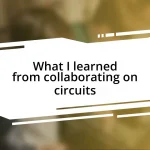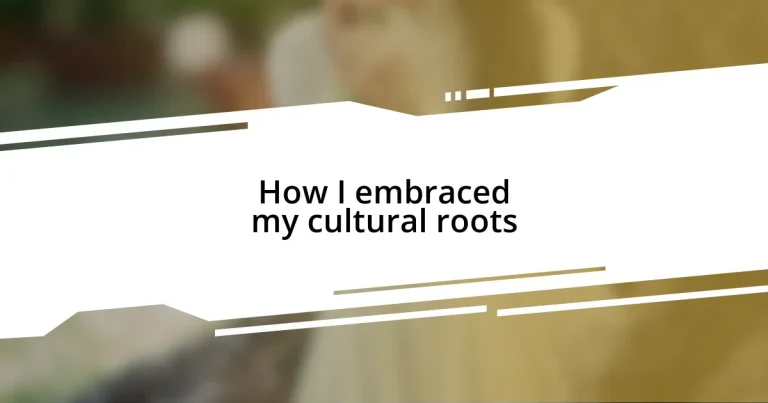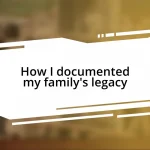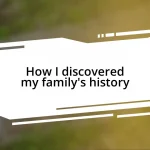Key takeaways:
- Cultural identity is a personal journey shaped by heritage, memories, and shared experiences with family.
- Engaging with cultural traditions fosters a sense of belonging and connection to one’s roots.
- Community events and storytelling create bonds and help preserve cultural narratives across generations.
- Reflecting on personal experiences enhances understanding of cultural identity while embracing diversity.
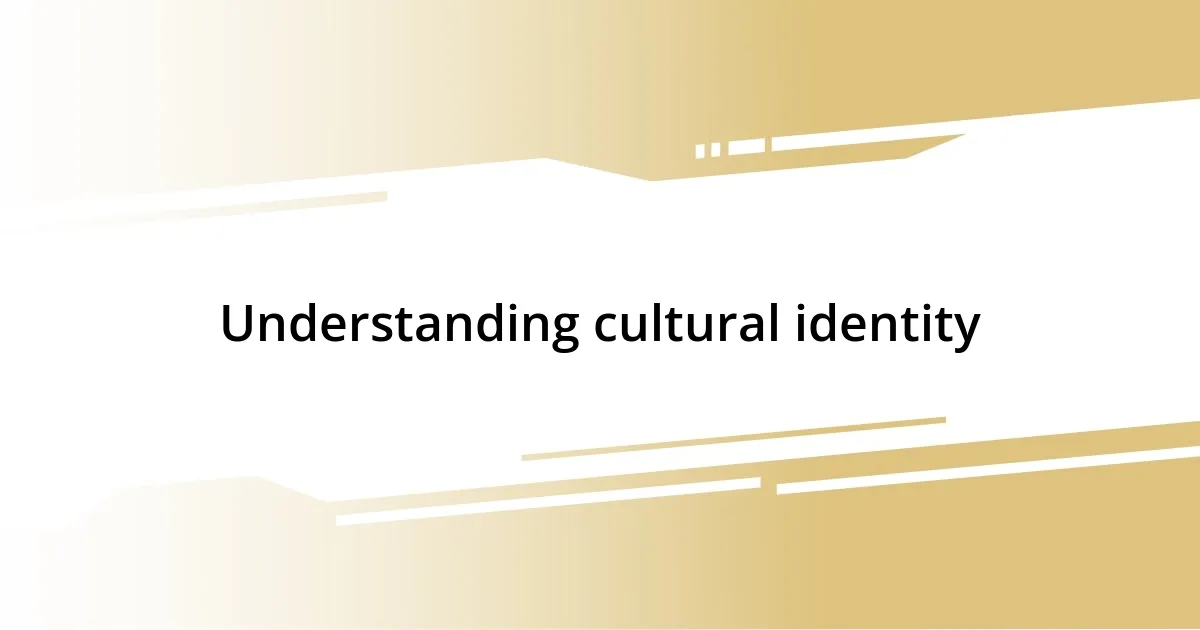
Understanding cultural identity
Understanding cultural identity is a deeply personal journey that intertwines our heritage, beliefs, and experiences. I vividly remember sitting around the dinner table with my grandparents, listening to their stories that painted a picture of our family’s past. Those moments helped me realize that cultural identity isn’t just about traditions—it’s the tapestry of memories and values that shapes how we see ourselves in the world.
As I navigated through life, I often pondered what made me feel truly connected to my roots. Was it the food, the language, or perhaps the music that stirred something inside me? I found that each element played a role, but it was the shared laughter and love in my family’s gatherings that made me feel whole. These experiences taught me that understanding cultural identity is not just about knowing where you come from; it’s also about feeling a sense of belonging that can sometimes be elusive.
What intrigues me most about cultural identity is how it evolves over time. I’ve learned that as I embrace my heritage, I’m also inviting new influences into my life. I often wonder: can one truly honor their roots while also adapting to the ever-changing world around us? This balance is something I strive for daily, reinforcing the idea that cultural identity is both a fixed foundation and a fluid journey.
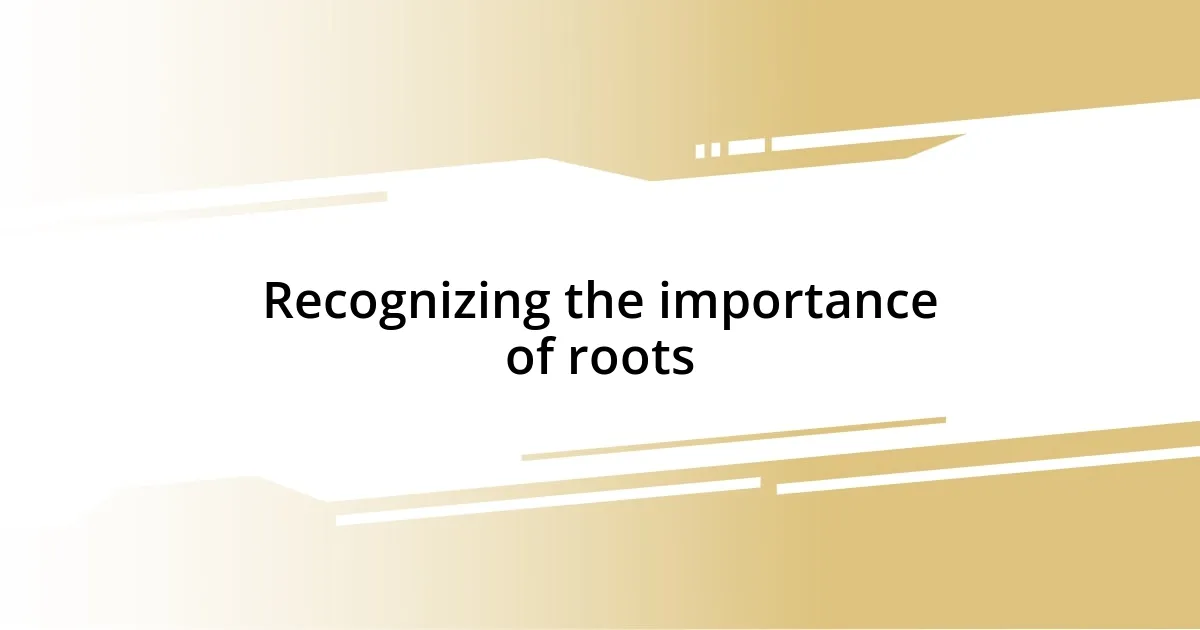
Recognizing the importance of roots
Recognizing the importance of roots is something I came to appreciate during a recent trip back to my grandparents’ hometown. As I walked through the old streets, memories flooded my mind, connecting me to stories of resilience, pride, and love. It struck me just how vital these roots are; they provide us with a sense of grounding, a link to who we are and where we came from.
I once attended a festival celebrating my cultural heritage, and despite being surrounded by strangers, I felt an overwhelming sense of belonging. The music, the dances, and even the familiar aroma of traditional foods wrapped around me like a warm blanket. I realized that these gatherings aren’t just events; they’re essential in recognizing our roots, as they help us forge connections with others who share our stories.
Reflecting on my experiences, I find that understanding my cultural roots enriches my life in countless ways. It helps me navigate challenges with a strong sense of self, offering comfort in times of uncertainty. When I face difficult moments, remembering my heritage reminds me of the strength and perseverance that have been passed down through generations.
| Aspect | Importance |
|---|---|
| Cultural Heritage | It shapes our identity and offers a sense of belonging. |
| Connection to Ancestors | It instills values and traditions that guide our actions. |
| Community Engagement | Participating in cultural events fosters relationships and support. |
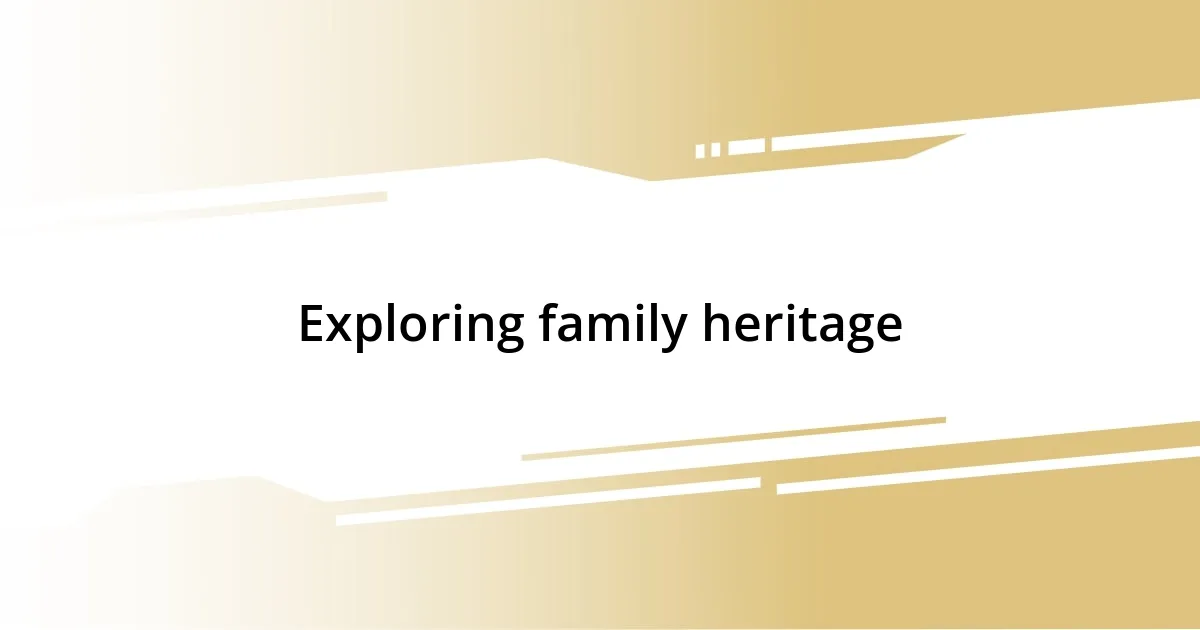
Exploring family heritage
Exploring family heritage has been a journey filled with discovery. I remember the first time I uncovered an old family photo album hidden away in my grandmother’s attic. The images told tales of joy, sorrow, and resilience. Each photograph felt like a piece of a puzzle, revealing the vibrant lives of my ancestors that had shaped our family narrative. It was humbling to realize that these stories were not just part of history—they were part of me.
As I delved deeper into my family’s history, I began to appreciate how our cultural practices are woven through our everyday lives. Here are some aspects that stood out to me:
- Storytelling: Sharing stories from the past reinforces family bonds and provides moral lessons.
- Traditions: Participating in family traditions, like Sunday meals or holiday celebrations, creates a sense of continuity and connection.
- Heritage Sites: Visiting places where my ancestors lived connected me to their experiences and struggles.
- Cultural Practices: Engaging in customs such as dances or crafts introduced me to the richness of our heritage.
Each exploration felt like a crucial stepping stone in understanding where I come from, deepening my sense of belonging in a world that often feels chaotic. The more I learned, the more I recognized the threads that bind my family’s past to my present.
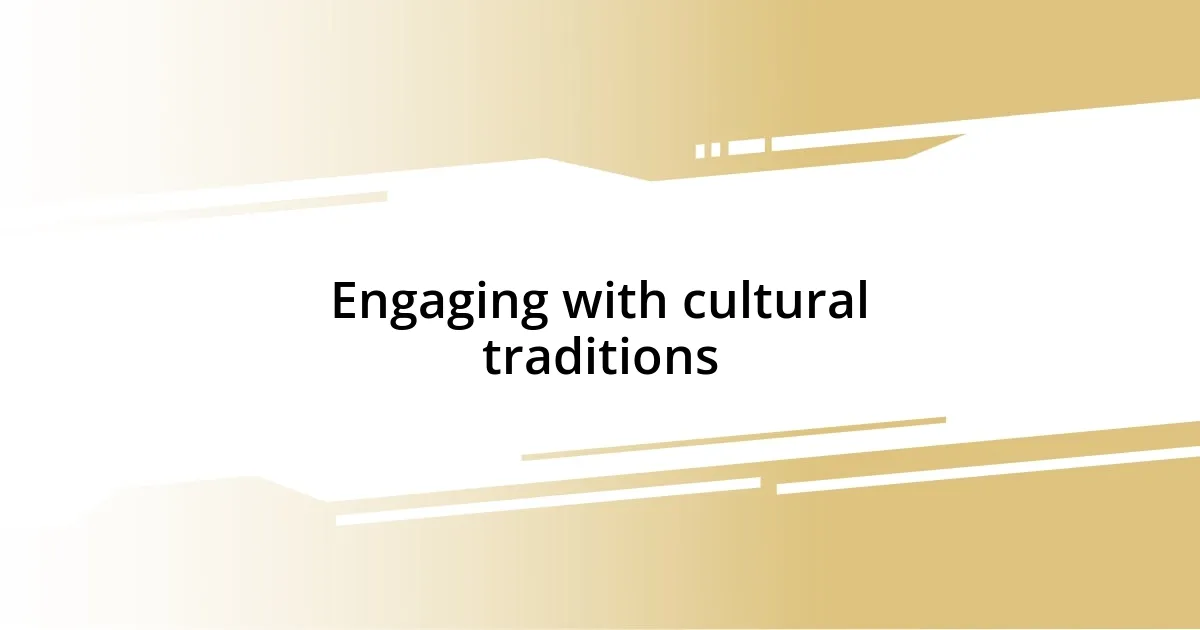
Engaging with cultural traditions
When I think about engaging with cultural traditions, I often remember the weekend I spent preparing for a traditional festival with my family. We gathered in the kitchen, laughing and sharing stories while we cooked recipes handed down through generations. The smell of spices filled the air, and I felt an indescribable warmth—a connection not just to my family, but to my ancestors who had celebrated similar moments. Isn’t it fascinating how food can bridge time and space, reminding us of shared experiences?
Participating in local cultural events also opened my eyes to the richness of my heritage. I recall attending a community dance, where everyone, young and old, came together to celebrate. As I moved to the rhythm, I felt a surge of joy and freedom. It struck me then that these traditions are not merely performances; they are a way of expressing our identity. They create a tapestry where each thread—each dance, each song—represents a story of those who came before us. How often do we take the time to celebrate those who have shaped our lives?
Moreover, I’ve discovered that engaging with cultural practices can spark a sense of belonging in unexpected ways. One evening, while crafting traditional ornaments for a holiday, I found myself lost in thought about the hands that had done the same work before me. Each bead I strung felt like a conversation, connecting me to my past. Reflecting on these moments makes me wonder—how can we continue to pass down our stories and values to future generations in a world that’s ever-changing?
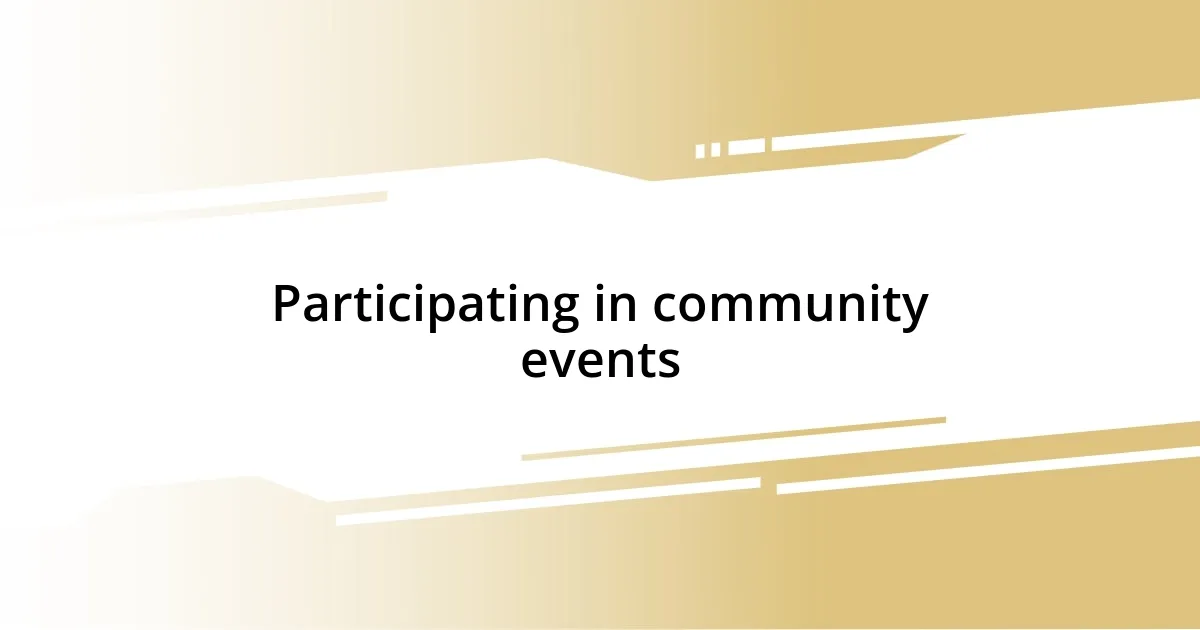
Participating in community events
Participating in community events is where I truly felt the heartbeat of my culture. One summer evening, I found myself at a local cultural festival, surrounded by booths bursting with the colors and flavors of my heritage. As the sounds of live music danced around me, I couldn’t help but join in the festivities. The joy was infectious; everyone was sharing their traditions, food, and laughter. Isn’t it amazing how a shared experience can create bonds that transcend individual stories?
I recall a significant moment while volunteering at a neighborhood cultural celebration. I was tasked with leading a workshop on traditional crafts, and as I taught the intricacies of weaving, I sensed a connection forming with each participant. Their wide eyes and eager hands reminded me of my own childhood, where similar gatherings had ignited my passion for our heritage. It made me think: How often do we take the time to share and nurture these invaluable skills that tell our stories?
Through these community events, I’ve seen the power of coming together to celebrate our roots. One year, I brought my children to a cultural parade. Watching their eyes light up as they learned the dances and heard the stories was heartwarming. At that moment, I knew I had a responsibility to keep our traditions alive. Can you imagine the legacy we create when we invite others into our cultural tapestry, weaving them into the fabric of our heritage?
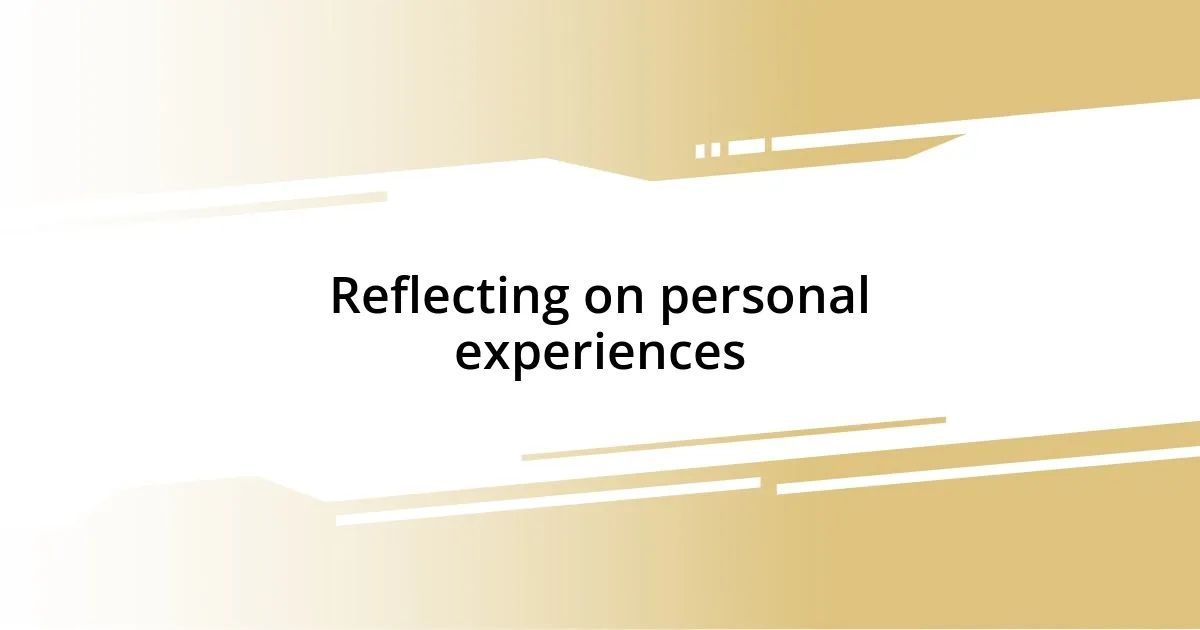
Reflecting on personal experiences
Reflecting on personal experiences, I often find myself revisiting my childhood summers spent with my grandparents. They would share stories of their lives, rooted deep in the culture I sometimes took for granted. Those evenings were more than just tales; they were lessons woven with laughter and poignant silences that spoke volumes. Have you ever experienced the magic of a moment that changes your perspective forever?
A vivid memory comes to mind—the first time I wore a traditional dress for a family gathering. I remember feeling a strange mix of pride and vulnerability. As I walked into the room, I could sense the weight of history in the fabric, connecting me to the countless women who had worn it before me. That moment sparked an awareness in me: how do we honor those who paved the way while forging our own identity?
As I reflect, I realize that these experiences shape not only who I am but also how I interact with the world around me. There’s a certain comfort in understanding where I came from. It fuels my passion to embrace my roots fully. The question lingers—how can we all find ways to honor our journeys while celebrating the diversity that surrounds us?
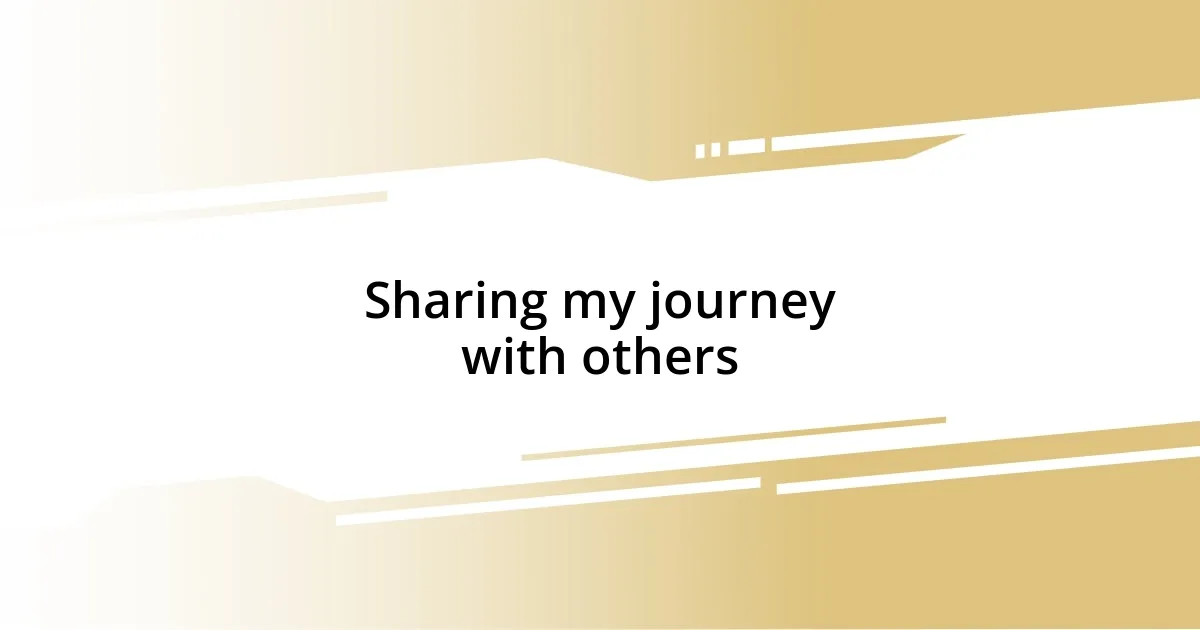
Sharing my journey with others
Sharing my journey with others has been a transformative experience. I vividly remember when I first began hosting cultural storytelling nights in my living room. Friends gathered around, sipping herbal tea as I shared anecdotes about my childhood and the lessons learned from my ancestors. Their reactions—as they laughed, gasped, or reflected—made me realize the profound impact of simply sharing my narrative. Isn’t it incredible how stories can bridge gaps and foster deeper understanding?
One evening stands out in particular. I invited a diverse group of friends, each with their own cultural backgrounds, to share a tradition from their lives. As we delved into our respective stories, I felt a connection form that was almost tangible. Listening to their experiences helped me appreciate the nuances of our different cultures while highlighting the universal themes of love, struggle, and joy. Don’t you think it’s our individual stories that unite us in the end?
Now, I actively encourage others to find their voices. I often remind my children that each tale they carry is a thread in the larger fabric of their heritage. Watching their excitement as they learn to embrace and share their own stories fills my heart with hope. It begs the question: How can we create spaces where everyone feels empowered to express their cultural narratives?



